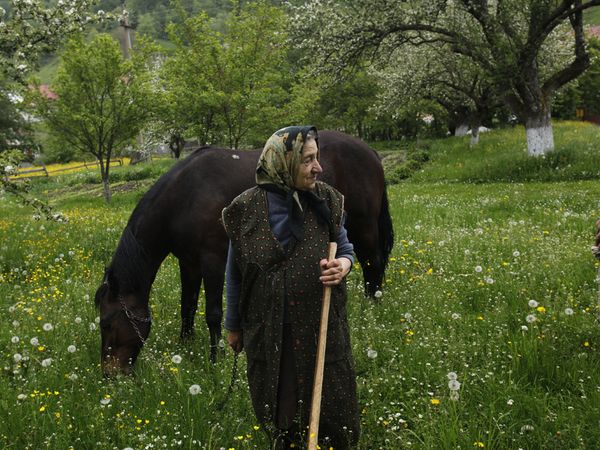He then cites further words of his namesake on creation, stressing that “rather than a problem to be solved, the world is a joyful mystery to be contemplated with gladness and praise.”
The Pope often refers to teachings on the environment from his recent predecessors, as well as Orthodox Ecumenical Patriarch of Constantinople Bartholomew I. And, throughout, he draws on previous papal and Church documents, as well as the teachings of some of the doctors of the Church: Sts. Thomas Aquinas, Benedict, Thérèse of Lisieux and Bonaventure. The 20th-century theologian Romano Guardini, a favorite of Pope Emeritus Benedict XVI, is frequently cited, as are statements from various bishops’ conferences.
Rejecting ‘A Throwaway Culture’
Calling on the “whole human family” to seek a sustainable and integral development, the Pope urgently appeals for a “new dialogue about how we are shaping the future of our planet.” In the face of this, Francis criticizes “obstructionist attitudes” and calls for a “new and universal solidarity.”
The encyclical’s first chapter presents the crisis affecting the environment, saying that the Earth “is beginning to look more and more like an immense pile of filth” and that its environmental problems are “closely linked to a throwaway culture.”
Climate change, it goes on to say, is a “global problem with serious implications” that represents “one of the principal challenges facing humanity in our day.” It notes other factors, such as volcanic activity, variations in the Earth’s orbit and axis and the solar cycle, but adds that “a number of scientific studies” show that “greenhouse gases” are released “mainly as a result of human activity.” This unsettled issue is shaping up as a main criticism by analysts.
“If present trends continue, this century may well witness extraordinary climate change and an unprecedented destruction of ecosystems, with serious consequences for all of us,” the encyclical says, adding that the “worst impact” will probably be felt in developing countries. It goes on to call for the drastic reduction of carbon dioxide and other polluting gases, substituting fossil fuels and developing renewable energy.
It points to the “tragic rise in migrants,” escaping poverty caused by environmental degradation, and tackles shortages and the poor quality of water in many parts of the world, saying it is a “basic and universal human right” and that to deprive the poor of water denies them the “right to a life consistent with their inalienable dignity.” The loss of biodiversity and extinction of species are also mentioned.
It speaks of the decline in the quality of human life and the breakdown of society, citing the “unruly growth” of cities, the effects of technological innovations and the omnipresence of the media. The encyclical also focuses on global inequality and calls for a “true ecological approach” to hear both the cry of the Earth and the cry of the poor.
Lack of Leadership
The encyclical draws attention to “weak responses” and a lack of leadership, noting, “It is remarkable how weak international political responses have been.” It criticizes a “superficial ecology which bolsters complacency and a cheerful recklessness.”
In Paragraph 60, Francis places the Church in between two ideological extremes: those who “doggedly uphold the myth of progress,” thinking that ecological problems will solve themselves, and those who view mankind as “no more than a threat, jeopardizing the global ecosystem.”
Early on, Laudato Si also rejects population control as a means of helping the environment, saying demographic growth is “fully compatible” with an integral and shared development.
“To blame population growth, instead of extreme and selective consumerism on the part of some, is one way of refusing to face the issues,” the encyclical says.
The document then draws on the “wisdom of biblical accounts” in relation to the environment and rejects the notion that, having been created in God’s image and given dominion over the Earth, mankind is justified in having “absolute domination over other creatures.” Furthermore, it says that when we see God reflected in all that exists, “our hearts are moved to praise the Lord for all his creatures and to worship him in union with them.”
In a later section, the document criticizes those who show “more zeal” in protecting other species than in defending human dignity or addressing “enormous inequalities in our midst.” Every act of cruelty “towards any creature is contrary to human dignity,” the Pope writes.
The Gaze of Jesus
Under the title “The Gaze of Jesus,” the document notes that Jesus lived in “full harmony with creation” and that the destiny of all creation is “bound up with the mystery of Christ.”
Chapter 3 is given over to what the encyclical calls technocracy — the dominance of technology over everyday life — and economic and political life. The Pope says this is reflected in architecture that “reflects the spirit of an age.”
He argues for a “bold cultural revolution,” in which society needs to slow down and look at reality in a different way.
Also in the chapter, it says modernity has been “marked by an excessive anthropocentricism” that actually obstructs ways of strengthening social bonds. It calls instead for “responsible stewardship” and says failure to acknowledge the worth of “a poor person, a human embryo, a person with disabilities” makes it difficult to recognize that “everything is connected.”
Failure to protect the human embryo, it says, makes it impossible to teach concern for the vulnerable.
The document further decries a culture of relativism that objectifies others, and Francis stresses the need to protect employment, saying it is “essential” to “prioritize the goal of access to steady employment for everyone.”
Laudato Si steps back from issuing a definitive statement on genetic modification, but it does say that a “number of significant difficulties” should not be “underestimated.” It also criticizes those who wish to impose limits on such research, while failing to “apply those same principles” to issues, specifically citing experimentation on human embryos.
Human Ecology
Chapter 4 is given over to “human ecology” and stresses the importance of “relationship between human life and the moral law, which is inscribed in our nature and is necessary for the creation of a more dignified environment.” It says it is “not a healthy attitude” to “cancel out sexual difference because it no longer knows how to confront it.”
“The acceptance of our bodies as God’s gift is vital for welcoming and accepting the entire world as a gift from the Father and our common home,” it says, “whereas thinking that we enjoy absolute power over our own bodies turns, often subtly, into thinking that we enjoy absolute power over creation.”
Chapter 5 concerns “lines of approach and action,” in which the Pope proposes dialogue to achieve a “broad consensus” on action. He says there is an “urgent need of a true world political authority” to deal with these global problems and that the environment cannot be “adequately safeguarded or promoted by market forces.”
The final chapter discusses education and spirituality and invites everyone to “ecological conversion” and a “new lifestyle,” even through small actions, such as carpooling and turning off unnecessary lights.
“Obsession with a consumerist lifestyle, above all when few people are capable of maintaining it, can only lead to violence and mutual destruction,” it says. “If we can overcome individualism, we will truly be able to develop a different lifestyle and bring about significant changes in society.”
It also calls for “sobriety and humility.” And towards the end, it says the Eucharist is a “source of light and motivation for our concerns for the environment, directing us to be stewards of all creation.”
Closing Marian Reflection
Ending with a reflection on Mary, the Queen of All Creation, he says that “we can ask her to enable us to look at this world with eyes of wisdom,” as well as implore St. Joseph to “teach us how to show care” for the world.
The Pope ends with two prayers, one from Basil the Great and the other by Pope Francis himself, to close what he calls his lengthy, “joyful and troubling” encyclical.
Edward Pentin is the Register’s Rome correspondent.
 photo: source internet
photo: source internet
























